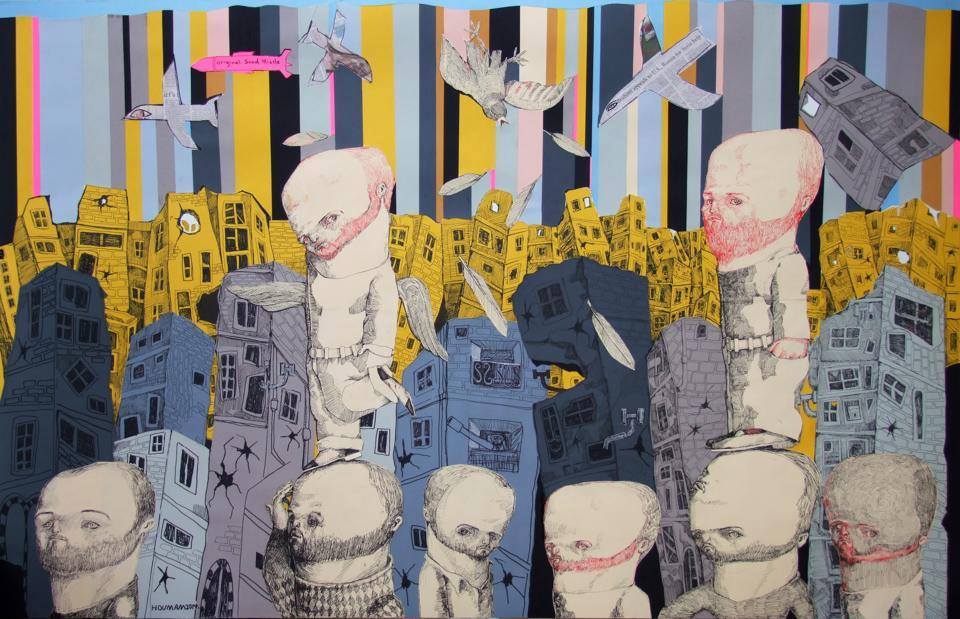
This publication has benefited from the support of the Rosa Luxemburg Foundation. This text may be reproduced in part or in full, provided the source is acknowledged.
A prevalent rhetoric portrays parallel economy as a set of illicit underground activities that the ruling power either tolerates or overlooks, for a lack of alternative solutions. These activities exist in the so-called “parallel” market and manifest themselves as second prices, different from those applied by the regulated market. For example, there is a parallel exchange rate for the U.S. dollar, different from the official one.
In the following analysis, I propose to consider two social dynamics connected to the very structuring of power: parallel economy as a counter-society and parallel economy as a set of bureaucratic instruments of command utilized by the power itself. Even when no illicit activities are involved, bureaucratic instruments can act underground, in non-transparent ways, blocking the democratic right for all to access goods and services. Officials who have the authority to sign permits in the currency exchange or the real estate markets, with their political clientele, have the power to monopolize and thus exclude. The excluded ones then resort to illicit informal activities.
Parallel Economy as a Counter-Society
This aspect of parallel economy has been thoroughly described in literature and, if there is no need to elaborate further on the subject, I will, however, only say this:
The most common black market is that of hard currencies. When it comes to other scarce goods, a large number of unemployed people undertake reselling activities. The suppliers are networks involved in the currency exchange market, since the price of illicit imports must be paid. These operations are facilitated by complicities inside the bureaucratic apparatuses of control. The various black markets appear to be segmented when they are, in fact, connected to each other. All together, they constitute “the one-and-only market”, which means that anything, from the exchange rates to the price of construction iron bars, is the same in the entire country. We are talking about a mafia.
Rather than undertaking industrial or service activities, owners of capital prefer to profit from the trafficking of exchange rates or from investing in the storage of goods that require authorizations to resell them in the parallel market (such as land, for example). In order to do this, they need to pay networks of intermediaries and small-scale vendors working under their command, who earn their living through these activities, and represent a social force attached to the existence of the black market. A counter-society is consequently structured. This economically powerful society (which sometimes represents up to 50 % of the Gross Domestic Product) is permeated by a market ideology that is often associated with Islam and which usually leads to Islamism – building on the status of the "excluded ones". When this parallel society reaches critical stages of development, it starts demanding more freedom of trade and seeks to access the power. This generates alliances between the black market and the bureaucratic authorities and leads to political rivalries for the “signature positions” that control access to currencies, loans, real estate, public markets, and so on.
Parallel Economy as a mode of Governance
The very first criterion is the exchange system that enables the classification of countries into two distinct categories: those who control the exchange rates and those that have a freely convertible currency. Only Saudi Arabia, Bahrain, UAE, Qatar and Kuwait have freely convertible currencies. In other countries, exchange operations are controlled more or less loosely and an authorization is needed to export money. This generates two phenomena: first, the emergence of the “waiting-in-line” market where the decision-making is political. And, second, the emergence of a secondary currency market for those excluded from the former one.
Access to loans are often reserved to a few. In most cases, what really facilitates access to credit is not the possession of financial guarantees, but the proximity to the political power. Prominent actors in the parallel economy with significant financial capabilities are excluded. They lend money to each other, not through the banks but through the retention of fiduciary money, stripping the state of its control over the money supply.
However, even when loans or exchange permits are obtained, access property is needed to implement a business or carry out real estate activities. Access to estates requires another authorization. In a country like Algeria, where the state owns the majority of the real estate, scandals occur frequently. The same happens in Egypt, where the army is the main owner of properties in the country. "To be able to get land (in Egypt), one must go through the army to gain a foothold," wrote Taufik Aklimandos (*). In Morocco, several public figures secured plots of land from the state at ridiculously low prices, before reselling them for ten times their normal price. Radio France Internationale (RFI) explained on 27/07/2016: "Two of the king's influential advisors, the governor of Rabat and two ministers seem to be implicated”. The allocation of land, even without resorting to bribery or corruption, creates loyal political clienteles.
Awarding public contracts often happens through informal or, at least, vague mechanisms. The largest and most lucrative operations are those related to oil and arms. The ‘Oil-for-Food Program’, imposed on Iraq between 1996 and 2003, exposed a parallel economic system that involved Iraqi officials, their political clients and foreign businessmen or politicians. In 2004, an Iraqi newspaper published a list of 270 people involved in the case, including 21 French (among them were French Minister Charles Pasqua, France's ambassador to the United Nations, and the company groups Total and Renault, etc.). These parallel transactions do not benefit the excluded population, but they tear the center of power. The removal of the Saudi oil minister, Ali al-Naimi, in May 2016 is one of the latest manifestations of this type of antagonism.
For example, the magazine ‘Le Moniteur du Commerce International’ revealed information about the “lack of transparency in public procurement” in Morocco. And in Algeria, we have the case of Mr. Ali Haddad, whose work as a public contractor, "enabled him to become the owner of the largest public works enterprise in Algeria”, according to the online magazine Orient XXI in an article published on April 26, 2017.
Other Arab countries are no less immune to these kind of practices. Whether it is in Tunisia, Egypt, Saudi Arabia, the UAE, or Qatar, public contracts are “reserved” to a particular group. They depend on corruption and proximity to those in power. All this forms a genuine parallel economy. As a result, the excluded ones, who are active in the parallel markets, try to form alliances with the bureaucratic class managing these administrations - sometimes through matrimonial relations. They either occupy these strategic positions themselves, or have their allies occupy them. The investment made, in this case, does not aim to create an economic enterprise, but to pay the expenses necessary to buy these kind of positions.
Another aspect of informality, commissions and corruption concerns the importation of capital, goods and services. Restrictions and quotas make permits accessible to some, who can be equity partners in imported capital, and exclude the others. Foreign investors in Saudi Arabia no longer need local partners in some sectors, they have the right to freely invest in all activities except for those mentioned in the “exclusion list”. The Investment Services Center (ISC) decides to either grant or reject an investment license. In the UAE, it is still prohibited for foreign partners to own more than 49 percent of a local company’s capital. Special authorization is required for the banking, insurance, health, maritime transport, media and telecommunications sectors. On the other hand, in Morocco, the investment regime has been liberalized, the only requirement is to notify the "Exchange Office". However, special authorizations are still required in the financial sector and for hydrocarbons and mining. In Algeria, 51 percent of the capital or more must be owned by local partners. In Tunisia, a new law was passed in 2016 simplifying the procedures, but a license must be obtained from the Superior Office of Investments and the Department of Foreign Affairs must grant the needed permits. In all these cases, obtaining the necessary signatures is subject to informal and non-transparent procedures.
In short, whenever the freedom of transactions is restricted in the market, an informal economy necessarily arises. This is inherent to capitalism. The key issue relies in finding out who benefits from these restrictions before asking a second question: are these restrictions compatible with economic rationality, or are they bureaucratic instruments in the hands of political governors? Most journalists cover stories about small vendors who work in the street markets often neglecting the highly profitable parallel signature market. Actors in this market of signatures work in the dark, away from suspicious eyes. Transporting, storing, and reselling products in the markets expose these actors and make them subject to indictment. On the other hand, intermediates and politicians affiliated with the signature market keep a low profile. They constitute the actual “grey economy”, whether in Saudi Arabia, Egypt, Tunisia, Algeria, or Morocco.
Various antagonisms arise from these configurations. Two essential kinds are:
1- A competition for positions with the power of putting signatures to different authorizations (foreign exchange, loans, real estate, public transactions, etc.). These rivalries emerge within the power itself, as it is the case in the recent reshuffling of the power structure in Saudi Arabia.
2- A defensive attitude by people in positions of command in order to exclude aspiring contenders, whether they are competent new-comers (unemployment is prevalent among the young new-graduates), or skillful workers (some were able to build up fortunes in the parallel markets). These excluded components, forced to act in a counter-society, develop an offensive attitude. They want to work in broad daylight and expand the scope of their means and accumulated wealth. They often rely on liberal ideologies and, in order to persist in their activities, have found in the Arab countries an existing ready-to-use ideology: Islam.
The content of this publication is the sole responsibility of Assafir Al-Arabi and Rosa Luxemburg Foundation cannot accept any liability for it.
Translated from Arabic by Sabah Jalloul
Published in Assafir Al-Arabi on 24/05/2018




